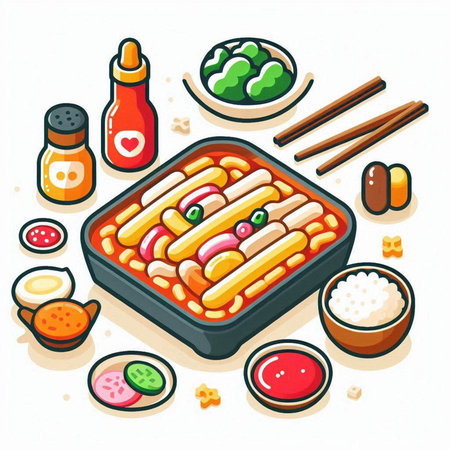1. Introduction to British Campsite Cooking Traditions
When it comes to enjoying the great outdoors in the UK, nothing quite captures the spirit of adventure and camaraderie like traditional campsite cooking. Rooted deeply in British culture, campfire meals are a cherished ritual, blending time-honoured customs with locally sourced ingredients and hearty flavours. From windswept coastal pitches in Cornwall to lush Lake District valleys, generations of campers have gathered around fire pits to share stories, laughter, and food cooked over open flames. The essence of British campsite cooking lies not only in what is served—think Cumberland sausages, fresh-caught trout, or rustic vegetable skewers—but also in how it’s prepared: slow-cooked over embers, often accompanied by mugs of tea or local ale. This communal way of eating fosters connection, turning mealtimes into memorable occasions set against the backdrop of the UK’s historic landscapes. Whether reliving childhood scout trips or creating new family traditions, the rituals of fire pit BBQs remain a beloved cornerstone of the British camping experience.
2. Selecting the Perfect Fire Pit for the British Outdoors
When it comes to traditional British campsite cooking, your choice of fire pit can make or break the experience. The UK’s notorious weather—think sudden showers, blustery winds, and persistent damp—demands a fire pit that’s up to the task. Additionally, many campsites have their own regulations governing open fires and barbecues, so making an informed selection is critical.
Key Considerations for British Conditions
- Weather Resistance: Opt for fire pits made from rust-resistant materials such as stainless steel or high-quality cast iron. A snug-fitting lid is invaluable for keeping out rain when not in use.
- Wind Management: Look for fire pits with wind guards or deep bowls to help maintain a steady flame even on gusty days.
- Portability: For those venturing into remote countryside or National Parks, portability is key. Collapsible legs or lighter-weight designs help with transport without sacrificing sturdiness.
- Regulation Compliance: Many UK campsites require raised fire pits to protect grass and prevent ground scorch. Some even specify minimum distances from tents and trees. Always check site-specific rules before you travel.
- Fuel Type: Traditionalists may favour wood for its authentic aroma and crackle, but some sites permit only smokeless fuels or charcoal to minimise environmental impact and smoke nuisance.
Comparison Table: Popular Fire Pit Types for British Campsites
| Fire Pit Type | Main Material | Best For | Weather Suitability | Campsite Friendly? |
|---|---|---|---|---|
| Bowl Style (Steel) | Stainless Steel/Coated Steel | Larger Groups & Versatile Cooking | Good (with cover) | Often Yes (if raised) |
| Brazier/Tripod Grill | Ceramic or Cast Iron | Sausages, Skewers, Stews | Excellent heat retention; needs shelter from rain | Check fuel rules; usually OK if contained |
| Portable Folding Fire Pit | Mild Steel/Aluminium Alloy | Wild Camping & Hikers | Adequate; may need extra wind guard | Yes (if raised & compact) |
| Chiminea Style | Ceramic/Cast Iron | Sheltered Sites & Smaller Meals | Very good; protects flame from wind/rain | Seldom permitted due to bulk & weight |
Countryside Code Reminder
The Countryside Code urges campers to leave no trace and avoid damaging natural habitats. Always clear up ash responsibly and ensure your chosen fire pit prevents sparks or embers escaping, especially in dry spells when wildfire risk increases. By choosing wisely, you’ll enjoy the warmth and flavour of a true British campfire barbecue without falling foul of local restrictions—or the weather.
![]()
3. Top BBQ Combos: Classic British Meals Reimagined for Fire Pits
When it comes to campsite cooking in the UK, nothing beats putting a fresh twist on our much-loved classics. Fire pits open up a world of smoky, satisfying flavours that take traditional British meals to the next level. Here’s how you can showcase the best of British fare over open flames, with practical tips to help you master each combo.
Bangers and Mash – Fire Pit Edition
Start with quality British sausages—think Cumberland or Lincolnshire—and cook them directly over the fire pit grill for that irresistible char. To perfect your mash, wrap peeled potatoes in foil, nestle them into the embers, and let them bake until fluffy. Mash with butter and a splash of milk once done. For extra flair, simmer onions in a cast-iron pan over the fire to create a rich gravy.
The Ultimate Bacon Butty
No British camp breakfast is complete without a proper bacon butty. Lay thick-cut rashers on the grill and let them crisp up while absorbing that woodsmoke aroma. Toast your baps or soft rolls at the edge of the fire for just a minute or two—watch closely! Slather with butter, load up with bacon, and add brown sauce or ketchup as per tradition.
Cornish Pasties – The Campfire Way
For a real treat, try making Cornish pasties from scratch or bring pre-made ones from home. Wrap each pasty in foil and place it near—not directly on—the embers to gently heat through. This method keeps the pastry flaky and the filling piping hot. Serve with a mug of strong tea for an authentic touch.
Tips for Fire Pit Cooking Success
- Always use hardwoods like oak or ash for a steady heat and clean smoke flavour.
- Invest in sturdy tongs and a heavy-duty grill grate designed for fire pits.
- Keep ingredients prepped and stored in cool bags to streamline cooking at camp.
A Final Thought
By reimagining these classic dishes for the fire pit, you’ll enjoy both nostalgia and innovation on your next British camping trip. Embrace experimentation and savour those simple pleasures under the open sky.
4. Essential Gear and Fire Management Tips
Proper kit and mindful fire management are the backbone of any successful British campsite BBQ. Let’s break down the essentials you’ll need, how to choose the right firewood, and some top tips for safety and sustainability.
Must-Have Grilling Accessories for British Campsites
| Accessory | Purpose | Why It Matters for UK Campsites |
|---|---|---|
| Portable Fire Pit | Central cooking and heat source | Most campsites require raised, contained fires to protect grass and soil |
| Cast Iron Griddle/Grill Plate | Even cooking surface for classic British breakfasts or bangers | Retains heat well, ideal for variable UK weather |
| Long-Handled Tongs & Spatula | Safe food handling over open flames | Keeps hands clear from heat while flipping burgers or moving sausages |
| Heatproof Gloves | Protection when adjusting logs or grates | Essential for both safety and confidence at the firepit |
| Spark Guard/Lid | Controls embers and assists with extinguishing fires safely | Helps comply with campsite fire regulations and wind protection in blustery conditions |
| Reusable Plates & Cutlery (preferably enamelware) | Sustainable eating without single-use waste | Tough enough for outdoor use; easy to clean up on-site |
| Fire Starter Kit (eco-friendly kindling, matches/lighter) | Easily light your BBQ in damp British conditions | Avoids frustration—especially after a rainy night! |
Choosing the Right Firewood: A Quick Guide
| Wood Type | Best For Cooking? | Notes on Availability & Use in UK Campsites |
|---|---|---|
| Ash/Oak/Birch (seasoned) | Yes – burns hot, low smoke, consistent heat output | Commonly available locally; always use dry, seasoned wood for minimal smoke and better flavour. |
| Pine/Spruce/Fir (softwoods) | No – too resinous, smoky, can taint food flavour | Avoid where possible; only use in emergencies and never for direct grilling. |
| Bought BBQ Briquettes/Charcoal (sustainably sourced) | Excellent – easy to transport, consistent burn, low mess. | Select FSC-certified products to support sustainable forestry. |
Sensible Fire Safety and Eco-Friendly Practices at the Campsite
- Select your site wisely: Always use designated fire pits or raised grills—never light directly on grass or peat.
- Keep water or sand nearby: Essential for quick extinguishing if wind picks up or embers escape.
- Avoid disposable BBQs: Many UK sites ban these due to wildfire risks—opt for reusable pits instead.
- Burn only what you need: Keep fires small, manageable, and never leave them unattended.
- Tidy as you go: Collect all rubbish and food scraps—this keeps wildlife safe and your pitch pleasant for the next campers.
- Douse thoroughly: Before bed or leaving site, pour water over the ashes until cold to touch—never leave smouldering embers behind.
A thoughtful approach to gear selection and fire management not only ensures delicious meals but also keeps our beautiful countryside safe for everyone. With these essentials packed and practices followed, you’ll enjoy a true taste of British campsite BBQ tradition.
5. Social and Seasonal Considerations
Campfire cooking in the British countryside is never just about the food; it’s a cherished social ritual that brings people together, whatever the season. The etiquette of communal dining around a fire pit involves not just sharing hearty meals, but also fostering camaraderie and respect for tradition. Whether you’re gathered on a brisk Bonfire Night or enjoying a lazy summer bank holiday, the way you prepare and share your BBQ has deep roots in local culture.
The Joys of Communal Campfire Dining
In true British fashion, every member of the group typically lends a hand—someone tends to the fire, another flips sausages, while others pass around plates and condiments. It’s customary to offer food generously, ensuring everyone has their fill before returning for seconds. Conversation flows as freely as the tea (or cider), making these moments as much about connection as cuisine.
Nods to British Holidays and Festivals
Traditional fire pit BBQs often coincide with key dates: think smoky burgers on Guy Fawkes Night, spiced kebabs during Glastonbury Festival, or classic bangers at a Jubilee street party. Each event calls for its own culinary tweaks—warm stews for chilly spring bank holidays, light salads and grilled fish for those rare scorching summer days.
Adapting to the Unpredictable British Weather
No discussion of British campsite cooking is complete without mentioning the weather. Rain showers might prompt a shift to foil-wrapped veg nestled in embers or quick-cook skewers that can be whipped off the grill between downpours. A pop-up gazebo or windbreak is often part of the essential kit, ensuring that neither drizzle nor gusts dampen spirits—or supper.
Ultimately, the magic of fire pit BBQs at a British campsite lies in their adaptability and inclusivity. Embracing seasonal changes and celebrating togetherness ensures that every meal becomes a memorable event, regardless of what the forecast holds.
6. Recipes and Step-by-Step Cooking Guides
Classic British Fire Pit BBQ Recipes
The beauty of campsite cooking lies in simplicity, letting quality ingredients and the open flame do most of the work. Here are a few tried-and-true British classics, tailored for fire pit BBQs. Whether you’re new to fire cooking or a seasoned enthusiast, these recipes are easy to follow and guaranteed to please a hungry crowd.
Hassle-Free Fire Pit Sausage Baps
Ingredients:
- Good-quality British sausages (Cumberland or Lincolnshire work well)
- Soft white baps
- English mustard or brown sauce
- Optional: caramelised onions
Instructions:
- Place sausages directly on the grill grate over medium heat. Turn regularly for even browning.
- Cook for 10-15 minutes until golden and cooked through.
- Serve hot in baps with your choice of sauce and a generous spoonful of onions if desired.
Campfire Jacket Potatoes with Cheddar & Chives
Ingredients:
- Large Maris Piper potatoes
- Mature cheddar cheese, grated
- Fresh chives, finely chopped
- Butter, salt, and pepper
Instructions:
- Wrap each potato tightly in foil and place directly in the embers.
- Turn occasionally; cook for 45-60 minutes until tender when squeezed.
- Unwrap, split open, add butter, cheddar, chives, salt and pepper. Let the cheese melt before serving.
Sizzling Fire Pit Veg Skewers (Veggie Option)
Ingredients:
- Mushrooms, cherry tomatoes, red onion, courgette – cut into chunks
- Olive oil, sea salt, cracked black pepper
- Dried mixed herbs (optional)
Instructions:
- Toss veg in olive oil and season well.
- Thread onto skewers and place over hot coals.
- Grill for 8-10 minutes, turning until nicely charred but still tender.
Campsite Tips for Success
Preparation is key: Chop veggies and prep marinades at home for less fuss on site.
Fire management: Allow your fire to burn down to hot embers before cooking—this prevents burnt outsides and raw insides.
British condiments: Don’t forget the essentials—HP Sauce, English mustard, Branston pickle—for that authentic touch.
Sociable serving: Serve everything family-style so everyone can tuck in together around the fire.
7. Conclusion: Embracing British Campfire Culture
As we draw the embers of our exploration to a close, it’s clear that the ultimate fire pit BBQ combos are more than just culinary kits—they’re invitations to participate in a rich tradition that spans generations across the UK. The quintessential British campsite experience is about more than simply cooking outdoors; it’s about gathering friends and family around the warmth of a crackling fire, sharing stories, and relishing food that evokes both nostalgia and adventure. By blending time-honoured techniques—like grilling over wood or simmering stews in cast iron—with innovative BBQ combos designed for today’s campers, you can craft memorable meals that pay homage to heritage while embracing modern convenience. Whether you’re reviving classic dishes such as bangers and mash or experimenting with regional ingredients from Scotland to Cornwall, each fireside feast becomes a celebration of local culture and landscape. So next time you set up camp beneath Britain’s dramatic skies—be it along a windswept coastal path or deep within an ancient woodland—let your fire pit BBQ combo serve as both hearth and hub. Embrace the spirit of British campfire cooking: experiment boldly, respect tradition, and share the joy of good food under open skies for unforgettable moments wherever your adventures take you.


